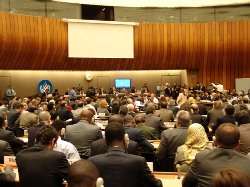Seventh-day Adventist world church communication directors, representing each of the church's 13 global regions (divisions), voted to approve a statement of ethics for church communicators, a key conclusion of a five-day advisory session held March 20 to 24. The group also learned about a new certificate program for communicators, which is being developed by faculty at U.S. based Andrews University and the General Conference as world headquarters.
"To glorify God is the ultimate intent of all communication," the ethics statement begins. "The context of all messages should be the good news of the love of God and the hope of the Second Coming of Jesus Christ," it continues.
The ethics statement-- a recommendation and not a mandate -- is designed to encourage a high standard of responsibility for Adventist Church communication. As the statement notes, "Freedom to communicate with integrity, openness, objectivity, honesty, sensitivity, diversity, and excellence is a priority; employers and constituencies are to be informed of a need for transparent, honest and open communication."
According to Rajmund Dabrowski, communication director for the world church, "Such a statement was perhaps long overdue. Adventist communicators on all levels of church service will do all that is within the framework of legality, but will also be ethical and sensitive to cultural values and beliefs. The statement makes clear as to where we base our communication vocation, and where our point of reference is."
He added, "As an Adventist and a communicator, I will endeavor to engage myself in truthful, accurate and fair communication -- one that facilitates respect and mutual understanding between people. In the statement we have articulated the framework of our conduct as professionals, and as members of the Adventist Church. We know who we are and we know our mission."
Another element of the ethics statement concerns the manner in which church communication business is to be conducted: "Communication activities should be free from conflicts of interest; nepotism and favoritism have no place in hiring and promotion of communicators and their staffs; contracts should be awarded fairly, and not on the basis of undue influences," the statement notes.
Along with the ethics activity, communication directors from the church's world regions heard a range of presentations on subjects. One of the more important presentations was news of the certificate program, aims to help church communication leaders develop and sharpen their skills.
The 12-credit, three-year program, which can also be the beginning of a master's degree in interdisciplinary studies, can consist of "intensive" class sessions at Andrews, the church's flagship university, located in Berrien Springs, Michigan, United States, or, on sufficient demand, at other locations worldwide. Issues involving specific skills, ethical matters, and communications topics, will comprise the curriculum.
"This will help the world [church] to benefit from up-to-date ideas, courses and technology relative to communication," said Dr. Melchizedek Ponniah, an assistant communication professor at Andrews. "I believe this will help to take the whole communication ministry to a greater level of professionalism."
In other actions, the regional directors heard from staff of the General Conference communication department on topics including media relations, public relations and news reporting and photography. Discussions included the Ground7News podcast, as well as Adventist News Network (ANN).
The meeting also focused on a need for intentional communication with church members in local congregations. The "Tell the World" vision, adopted by the Adventist church at the world church session in St. Louis, Missouri, in July 2006, "requires clear messages to be communicated with our own people," said Michael Ryan, a general vice president of the world church, and advisor to the communication department.
Special attention was paid to the Internet and its use for evangelism and building communities of faith. Speakers who discussed Internet issues included Mark Finley, a general vice president of the world church, and Michael Dabrowski, a lay member who is an Internet professional. Finley spoke on the potential of the Internet for outreach, while Dabrowski emphasized the need to create Web sites that help meet the needs of visitors. The advisory meeting also included a presentation about the netAdventist service, an Internet-based system which uses combines localized Web content with live streams of information from the global Adventist Church.
Pastor Jan Paulsen, world president of the Seventh-day Adventist church, visited the meeting and told communicators that their department exists "to serve all the other departments" at a church headquarters, as well as church administration.
Paulsen also stressed the relationship between communication and the mission of the church, saying that communicators need to "reach out to your communities" in sharing a message of hope.
The world communication advisory will be followed by regional meetings over the course of the next year, as well as special visits by church staff to help local communicators. [Editor: Mark A. Kellner for ANN/APD]

